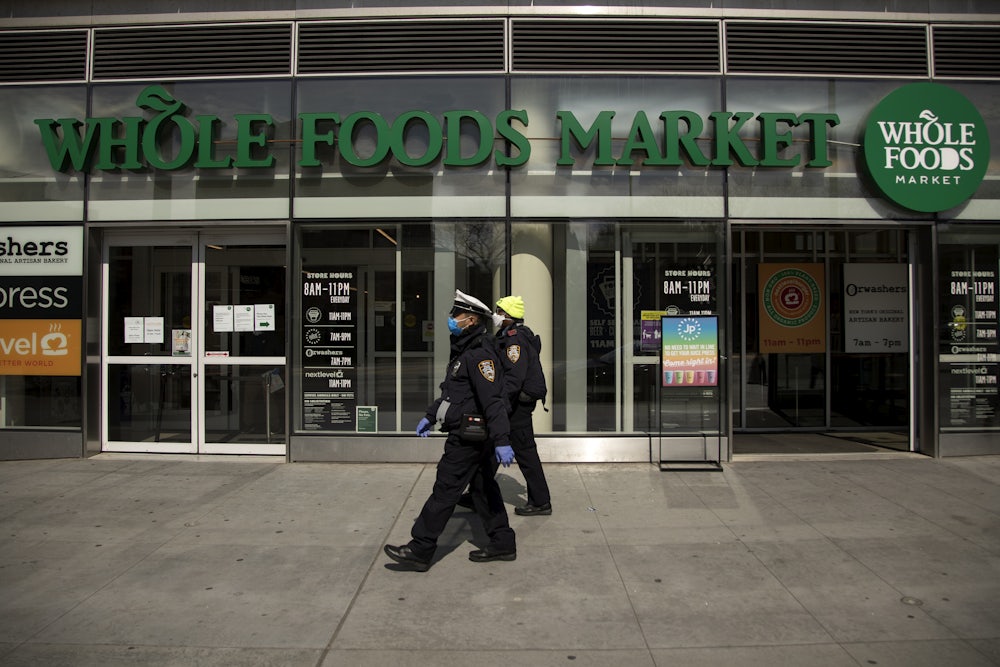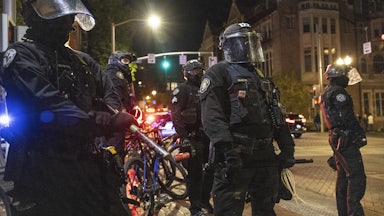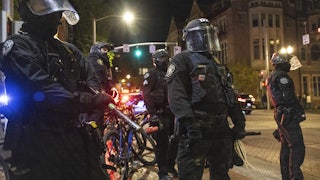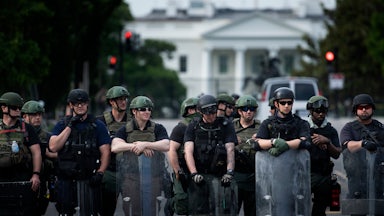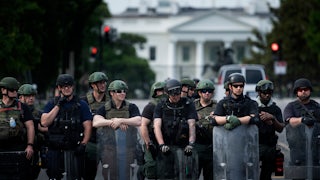All across the country, at grocery stores, nightclubs, and construction sites, police officers are standing guard: uniforms on, guns in holsters. But not every cop you see out in your community is necessarily on the job at that moment, reporting to the police departments in their city or town. Rather, they’re working for private businesses through an under-the-radar practice called off-duty policing. In what’s become a vital and attractive means of secondary employment, off-duty policing allows officers to take their uniforms to a second job.
According to a paper published in the Illinois Law Review in 2017, “A substantial majority of agencies—about 80%—allow officers to engage in moonlighting, and tens of thousands of officers at those agencies log millions of hours every year working for private employers.” In Washington, D.C., for instance, the Metropolitan Police Department authorized 1,143 officers—about 30 percent of the force—to take off-duty jobs in 2018, according to a public records request response. These officers can often be seen overseeing the checkout lines and entrances at Whole Foods grocery stores.
Now several companies are looking to profit off the practice of secondary employment—deploying the mechanics of the gig economy that’s already transformed so much of the service industry—in bids to become the “Uber” that connects cops to these second jobs. Much like their Silicon Valley forebears, it’s an open question whether these companies truly will mitigate the concerns that revolve around the practice of off-duty policing, and there is reason to believe they may only make things worse.
There are myriad issues with off-duty policing on its own, some of which are merely practical. Municipalities—including D.C.—often don’t monitor the hours officers are working or the wages they are paid at these second jobs. For these off-duty cops, the long hours involved in working a second job can mean police force moonlighters show up for their real jobs tired and worn out.
But beyond these concerns, off-duty work has been at the center of corruption scandals in cities like New Orleans and Jersey City. A 2011 report from the Department of Justice called off-duty policing the “aorta of corruption” inside the NOPD, contributing to both “abuse” and inequitable policing. In some of the most egregious cases, officers extorted business owners, threatening to stop responding to calls unless the owners agreed to hire officers for exorbitant sums. In others, officers declined to arrest people who had employed them off-duty. In Jersey City, more than a dozen officers, including a former police chief, pleaded guilty to federal charges for defrauding the city by getting paid for off-duty jobs they never performed.
Despite all these concerns, off-duty policing has grown to be an estimated $12 billion industry. In the past few years, the race to grab a piece of that pie has accelerated, with new companies coming online to snatch up some market share. Firms such as RollKall, Off Duty Management, and Law Enforcement Specialists all have slightly different business models but generally do the same thing: match cops to lucrative second jobs either online or through a smartphone app.
In many cases, these companies partner with the municipality. To hear them tell it, this allows the gig economy companies to ameliorate the broader concerns around the practice. Steve Power, RollKall’s CEO, said that the company is aware of issues with policing broadly and criticisms of off-duty programs. RollKall seeks to mitigate those issues, he said, by bringing transparency, accountability, governance, and professionalism to the practice. “This is a $12 billion industry that’s being run on whiteboards and Post-It notes and text messages,” Power said. “We want it to be clear when an officer is working, who is working, where they’re working, what sort of work they’re doing. We want to provide that transparency.”
But the ability to provide this kind of oversight is only as good as the information at hand. Chivona Newsome, a co-founder of Black Lives Matter Greater New York, said she’s alarmed by the lack of data the NYPD—which runs its own “Paid Detail Program”—collects about officer misconduct and police arrests carried out by cops working their second jobs. “There’s absolutely no transparency. There’s no way to record what’s happening at these private jobs. No one knows, what cops are racially profiling Black people? Are more arrests happening? Is there the right amount of supervision?” she said. “By no one knowing about it, it allows them to operate with impunity.”
Seth Stoughton, a law professor at the University of South Carolina who has studied off-duty policing and wrote the aforementioned Illinois Law Review paper, said the practice also raises questions about taxpayer money. “If the officer is wearing their uniform, driving their police vehicle, using city or county gas, putting wear and tear on their equipment, and the city or the county isn’t actually getting paid, that means that the city or county is subsidizing that private employment,” he said.
Off-duty policing also raises questions about the role of police in our society. When an officer appears in uniform, to whom are they ultimately accountable? Brendan McQuade, a professor of criminology at the University of Southern Maine who studies the carceral state, said that off-duty policing makes explicit what is always lurking beneath the surface: that the system of policing is set up to secure private property and the conditions for consumption and wealth. For example, when you’re in a car accident and an officer files a report, he said, they’re working in the interest of the insurance companies, which need the report to financialize car accidents.
Off-duty policing only makes that perspective more naked and explicit. While it’s worth taking company claims with a grain of salt, RollKall advertises that it has partnered with 1,400 agencies. The company also prominently displays the logos for corporations it has placed officers with, including Exxon Mobil, AT&T, and Chick-Fil-A. (Law Enforcement Specialists advertises partnerships with Amazon, Walmart, and Bank of America.)
Not only do cops in second jobs bring the power of the law with them in serving private companies, there is sometimes little to stop groups of moneyed civilians from hiring their own officers, erecting their own tiered criminal justice system. In New Orleans, before an overhaul, the police department told neighborhood associations they could hire off-duty officers to patrol their streets after hours.
In many cases, the jobs done by off-duty officers are mundane, like directing traffic at construction sites. But it can be easy to transition from the innocuous to the insidious, McQuade said. In 2011, the conservative American Legislative Exchange Council hired off-duty Phoenix police for security for its States and Nations Policy Summit. That event culminated in the early and violent arrests of four Occupy Phoenix protesters. “These people exercising their constitutionally protected rights in a nonviolent way, this political challenge, was preempted and disrupted by contracted off-duty private cops,” McQuade said.
There are possible upsides to bringing in private partners to remove some of the opaque aspects to off-duty policing that make these gigs feel like under-the-table employment. These services, for example, have the potential to make some aspects of off-duty policing more transparent. If cops working second shifts have their hours and assignments logged into a database, municipalities can plan around potentially overworked officers.
Nevertheless, advocates of police reform aren’t entirely convinced by these rosier perspectives, and they warn that these new players that are seeking to make off-duty policing more accessible and efficient will only end up increasing all the avenues of contact between cops and civilians, and augment the ability to deploy a workforce that many believe has violent tendencies. “The idea that we could deploy cops faster everywhere is the exact antithesis of what communities are asking for, which is to curb the presence of police,” said Bianca Tylek, founder of Worth Rises, an anti-prison nonprofit in New York. “Having police in these jobs, whether they’re in uniform or not in uniform … typically escalates these things. They only know how to react to things in one way.”
Power, RollKall’s CEO, said that he doesn’t believe that off-duty cops working through his company are displacing private security officers. But if that’s true, that means that these programs are, as reformers fear, putting more cops in more places. “Uberizing off-duty police work is another way to fill in the gaps and make a more comprehensive police machine,” McQuade said. That machine increases the flow of people into the criminal legal system.
Yet even as concerns over the future commodification of police work run rampant, the drive to further enmesh cops into the gig-and-app economy is only accelerating. As Vice reported this week, Citizen, a popular neighborhood watch–style app that allows ordinary people to report crime and other suspicious activity in their neighborhood, is road-testing an on-demand service that would “deploy private security workers to the scene of disturbances at the request of app users,” in “a dramatic expansion of Citizen’s purview.” Given the fact that Citizen recently made news for posting “a photo of a homeless man” that it had wrongly identified as a suspect in the setting of a wildfire, while offering “$30,000 for information that could lead to his arrest,” there is reason to be skeptical, if not alarmed, by what the future holds.
